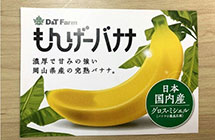拯救“懒癌晚期”:日本开卖能吃皮的香蕉 38元一根
|
In Japanese, it's being described as "Mongee" -- the "super" banana. It looks just like any other banana, but it's supposed to be softer and sweeter -- and its peel is edible. Even though they cost around $6 each, the special bananas have had no trouble attracting customers to the one place in the country where they're sold, the Tenmaya store in the southwestern city of Okayama.
超级香蕉由日本公司D&T Farm培育,该公司在其网站上声称,果皮富含维生素B6、镁和色氨酸。色氨酸是人体必需氨基酸之一,可参与人体内血浆蛋白质的更新。 The technique used by D&T Farm to create the Mongee banana is called "freeze thaw awakening." The process involves starting banana trees out in an environment that's nearly minus-80 degrees Fahrenheit, then moving the trees with their still-ripening bananas to a more temperate climate of around 80 degrees — an environment banana trees typically grow in the entire time. The extreme temperature variation puts the banana's growth into a sort of hyperspeed mode, so the peel doesn't fully mature, leaving it with a texture like "lettuce," a D&T Farm spokesman says, per the New York Post. 那么超级香蕉的果皮味道究竟如何呢? Taste-testers for the RocketNews24 site in Japan say the banana fruit itself — which has about 5 more grams of sugar per banana than the regular version — boasts a "very strong tropical flavor" akin to that of a pineapple. But the peel apparently lacks any specific taste. Although it's said not to have a "strange texture" and is "fairly easy to eat," the tasters add there "isn't much flavor"; one experimenter even said it was somewhat bitter, though not as much so as the peels of regular bananas, which he also tasted. 此外,由于超级香蕉必须完全成熟后才能食用,所以“色相”通常很一般,浑身都是黑色斑点。 Bananas are one of the most popular fruits in Japan. The country has long relied on imports from places like the Philippines, where the climate is better suited to growing the fruit. But D&T Farm is hoping to change that. "Japan imports a million tons of bananas annually, but only makes less than 1% of its consumption," CEO Tetsuya Tanaka said. "If bananas are produced locally, it will energize Japan's farming." Tanaka says the company's freezing formula could someday help address food shortages in the world by enabling farming in places known for cold, inhospitable temperatures like Siberia. |









